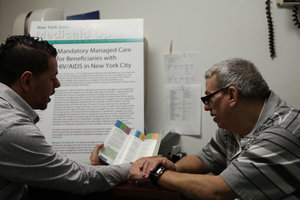Posted on 07 February 2011.
By Yiting Sun

Angle Flores, right, a Medicaid recipient with HIV, discussed the new managed care plan with his counselor. Photo: Yiting Sun
HIV-infected Medicaid recipients in the Bronx and the rest of the city must enroll in managed care plans because of a new policy mandated by the New York State Department of Health this January.
Within the scope of this new health care policy, all the New York City Medicaid beneficiaries infected with HIV must either enroll in a mainstream managed care plan or a special managed care plan designed for the HIV population.
This move is part of the State Department of Health’s latest measure to expand mandatory managed care throughout the city, to cut Medicaid costs, and improve care.
For the moment, the policy only applies to New York City. However, Medicaid recipients here are concerned that the new measures will translate into a higher copayment for AIDS medications and may even compromise the quality of their care.
“With managed care, you need approval and authorization to get various medications and to get various tests, it just kind of slows things down,” said Dr. Jonathan Samuels, an HIV specialist at St. Barnabas Hospital in the East Tremont neighborhood of the Bronx.
Under the new policy, people living with HIV/AIDS on Medicaid must choose between a regular managed care plan, which means staying with a primary care provider who coordinates health care services for the individual and makes referrals for both specialists and diagnostic tests if necessary, or a special needs plan, in which experienced HIV health care providers serve as primary care doctors.
People who do not receive federal disability benefits will have 60 days to decide after they receive a letter from the state. If they need more time, they can ask for an extra 30-day grace period. For those who already receive benefits, they will have 90 days to make a choice. Individuals who do not choose a plan before the deadline will be randomly assigned to a managed care plan.
Some health care providers believe this new policy will improve the quality of service to the HIV/AIDS population because it encourages more coordination among their health care providers.
“The mandatory managed care plan will make sure people with HIV receive the most appropriate care by the most appropriate provider in the most appropriate setting,” said Ralph Belloise, director of HIV services at St. Barnabas Hospital.
According to the Kaiser Family Foundation, a non-profit organization specializes in health policy issues, managed care aims to improve the quality of care and cut costs at the same time. The basic idea is to improve access to care and coordination of care by assuring that recipients have a medical home with a primary care provider, and to rely more heavily on preventive care rather than last-minute emergency room visits.
The state is uncertain exactly how much money this new measure will save, but a 2009 state health department report estimated that with HIV special managed care plans, inpatient costs were lowered by 44 to 52 percent per person per month, and the average costs per hospital admission were lowered by 28 to 35 percent.
Long-term advocates for the HIV/AIDS population generally welcome the new policy, but with some concern.
“Managed care programs typically cost states less money than fee-for-service plans, so it’s understandable that New York would want to make it mandatory for people living with HIV/AIDS to enroll in such programs, given the fiscal strains states face and the high costs of treating the disease,” said Johnathon Briggs, spokesman for the AIDS Foundation of Chicago. “If these plans don’t compromise the quality and delivery of care that those who rely on them expect and deserve, it should be a win-win for everyone.”
Dr. Samuels of St. Barnabas added that for the managed care plan to work efficiently, hospitals should identify the patients that really need certain medial services, and at the same time, avoid expensive tests like MRI when the patient only has minor conditions. “If they can cut the fat without cutting the bone, that would be great,” said Dr. Samuels.
For HIV/AIDS patients, the bone means doctor appointments and numerous medications. Some fear that managed care may impact both.
Angel Flores, a Medicaid recipient infected with HIV who lives on Grand Concourse, found that his copayments for prescription drugs cost him $30 more per month under the new plan.
“It was three dollars for one bottle, three dollars for another bottle, all these bottles accumulated,” said Flores, 52. “I was surprised when the pharmacist told me I had to give him 30 dollars.”
Flores also suffers from other chronic diseases like diabetes and asthma, so he cannot work. “I never had to pay before,” said Flores. “It’s very difficult.”
For people in need of HIV/AIDS-related care, the biggest benefit of the managed care plan is it helps reduce medical errors caused by bouncing around from one provider to another, said Belloise.
He said the variety of drugs available to treat AIDS symptoms might cause serious side effects when taken together, something only a supervising physician can help avoid since he or she oversees all the drugs a patient takes.
However, many AIDS patients, said Belloise, find ways to treat themselves. When one doctor refuses to prescribe a particular medicine the patient really wants out of concern for drug interactions, the patient often asks another doctor for the drug. These drug interactions may worsen the patient’s condition and cause more clinic or even emergency room visits. In the end, the Medicaid program is left to shoulder all the extra costs.
“Now one doctor controls your care,” Belloise added. “You go to one pharmacy, and the primary care doctor may refer you to a specialist, then the specialist send reports back to that doctor. So the one primary care doctor knows everything about you.”
AIDS advocate Briggs said that educating Medicaid recipients in an open and transparent manner about how these changes will impact them is key to a successful rollout.
In many cases, the change will be minimal. Another New York-based AIDS advocacy organization, Housing Works, pointed out that since people with HIV/AIDS have very specific treatment plans, if they need to see a specific doctor or get a specific service, these plans should not interfere with their special needs.
Right now the policy is for New York City only, but if it works, it will have an impact beyond the city’s borders. “Depending on the NYC experience and how it goes, we may expand it to the entire state,” said Ira Feldman, deputy director for Medicaid policy and programs at the New York State Department of Health.







